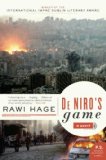Summary | Excerpt | Reviews | Beyond the Book | Readalikes | Genres & Themes | Author Bio

I will see you tonight, late, George said to me when he
dropped me back home. Then he drove away.
MIDNIGHT CAME; the noise of George’s motorbike filled the
neighbourhood. I went down to the alley where the men
watched the late-Friday-night Egyptian movie, smoking on
small balconies, gulping cold beer and araq, cracking fresh
green almonds, and with their filthy yellow nails crushing
American cigarettes in folkloric ashtrays. Inside their houses,
the impoverished women carefully, economically, dripped
water from red plastic buckets over their brown skins in
ancient Turkish bathtubs, washing away the dust, the smells,
the baklava-thin crust, the vicious morning gossip over tiny
coffee cups, the poverty of their husbands, the sweat under
their unshaven armpits. They washed like meticulous Christian
cats that lick their paws under small European car engines
that leak corporate oil extracted by exploited Nigerian workers
from underneath the earth where devils roam, and worms
gnaw on the roots of dead trees that are suffocated by factory
fumes and the greedy breath of white-skinned engineers.
Those lazy cats lingered under unwashed cars, watching the
passing of Italian shoes, painted nails, colourful and torn-out
cuffs, pointy high heels, plastic flippers, stomping naked feet,
and delicious exposed ankles that thick hands would bind,
release, and slip higher to reach a flow of warm fluid that carefully,
generously turned into a modest flood smelling of eel,
red fish, and rosewater.
We drove fast toward George’s aunt’s house. When we
arrived, George said, That is Chafiq Al-Azrak’s car. He pulled
out his gun. I gave the motorcycle gas and made it roar.
George shot the wheels of the car, and the air in them was
released. He aimed higher and shot the car’s lights, the door,
the tinted glass, the seat inside, his own reflection in the mirror.
He fired silently, and calmly danced around the car, then
pointed and fired again. The broken metal was penetrated
with tiny, damaging holes, quick and sharp. It was a lethal,
entertaining act of vengeance, and I liked it.
When it was over, we fled the scene. I drove the motorcycle
through sleepy neighbourhoods with endless wooden doors,
and I felt George’s gun brushing against my back. We reached
the open road, and our cotton shirts welcomed the wind; it
molested our skin and dwelt in our ears. I drove fast, impetuously,
and the wind stroked my eyes, entered my nostrils and
my lungs. I drove through streets of broken lamps, walls covered
with bullet holes, spilled blood that turned into dark
stains on dusty, neglected sidewalks. I drove and felt thirst in
my veins, convalescence and fresh wind in my chest. George
was breathing heavily behind my shoulder, like a mad dog,
howling to the air in triumph and demonic laughter.
Cocktail, he shouted in my ear. Let’s have a cocktail! I
made a quick and sharp turn. Like a Mongol rider I swung
George’s machine to the road, and the back wheel rolled and
crushed tiny pebbles. A grey cloud rose from the earth, and
I swung around and drove straight to the juice bar that was
open all night over the highway on the other side of town, in
the Armenian district, far from the Turks who had enslaved
my grandmother. We passed Cinema Lucy, where young men
and chronic masturbators watched a large screen that showed
American women with large chests getting hastily fucked by
men with large cocks who were dressed in cowboy suits or
as schoolteachers with afros and 1970s hairdos, over a jazzy
tune, on the border of a fancy pool, with maids in white
aprons who left their tiny skirts backstage on the director’s
door or the cameraman’s car seat, and bounced their liberated
1970s asses on the edges of long, plastic chairs, ready to serve
red cocktails with midget paper umbrellas.
Excerpted from De Niro's Game by Rawi Hage © 2007 by Rawi Hage. Excerpted by permission of Steerforth Press. All rights reserved. No part of this excerpt may be reproduced or reprinted without permission in writing from the publisher.
Your guide toexceptional books
BookBrowse seeks out and recommends the best in contemporary fiction and nonfiction—books that not only engage and entertain but also deepen our understanding of ourselves and the world around us.